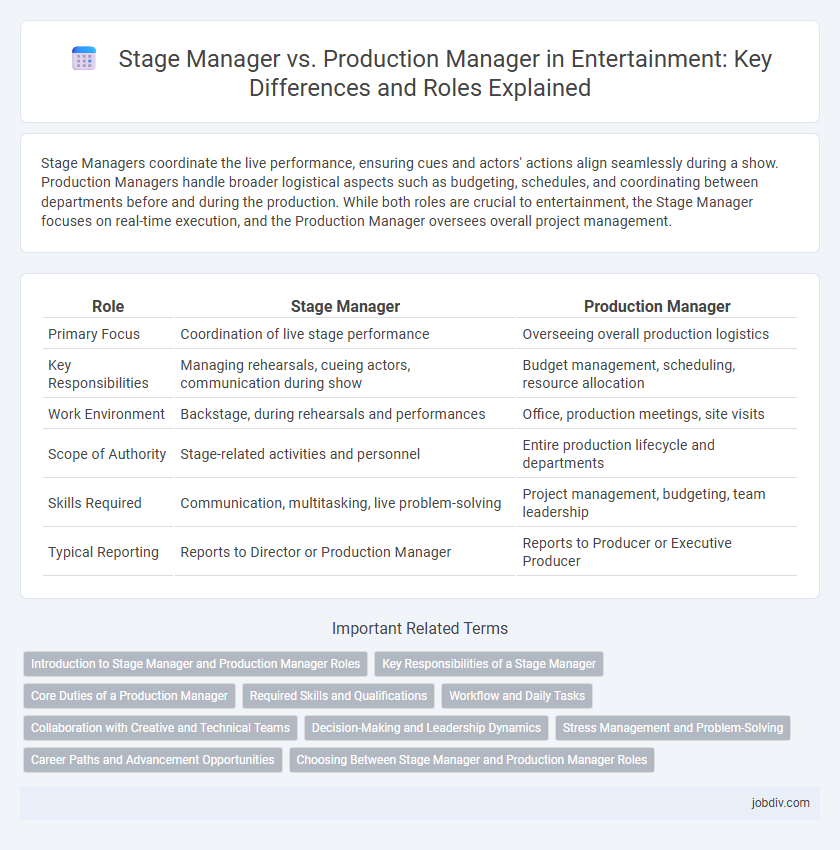Stage Managers coordinate the live performance, ensuring cues and actors' actions align seamlessly during a show. Production Managers handle broader logistical aspects such as budgeting, schedules, and coordinating between departments before and during the production. While both roles are crucial to entertainment, the Stage Manager focuses on real-time execution, and the Production Manager oversees overall project management.
Table of Comparison
| Role | Stage Manager | Production Manager |
|---|---|---|
| Primary Focus | Coordination of live stage performance | Overseeing overall production logistics |
| Key Responsibilities | Managing rehearsals, cueing actors, communication during show | Budget management, scheduling, resource allocation |
| Work Environment | Backstage, during rehearsals and performances | Office, production meetings, site visits |
| Scope of Authority | Stage-related activities and personnel | Entire production lifecycle and departments |
| Skills Required | Communication, multitasking, live problem-solving | Project management, budgeting, team leadership |
| Typical Reporting | Reports to Director or Production Manager | Reports to Producer or Executive Producer |
Introduction to Stage Manager and Production Manager Roles
Stage Managers coordinate live performances by overseeing rehearsals, managing backstage activities, and ensuring smooth communication between cast and crew. Production Managers handle the logistical and budgetary aspects, including scheduling, resource allocation, and vendor coordination to support the overall production process. Both roles are essential for delivering successful entertainment events, with the Stage Manager focusing on creative execution and the Production Manager on operational efficiency.
Key Responsibilities of a Stage Manager
A Stage Manager is responsible for coordinating all aspects of a live performance, including managing rehearsals, cueing actors and technical elements, and ensuring smooth transitions during the show. They act as the communication hub between directors, performers, and technical crews, maintaining timing and flow on stage. Their key tasks also involve documenting blocking, maintaining prompt scripts, and troubleshooting issues in real time to deliver seamless productions.
Core Duties of a Production Manager
A Production Manager oversees the entire logistical and financial aspects of a theatrical or film production, including budgeting, scheduling, and resource allocation. They coordinate with various departments such as lighting, sound, set design, and costume to ensure seamless integration and timely delivery. Their core duties emphasize managing vendor contracts, procurement, compliance with safety regulations, and tracking production milestones to keep the project on target and within budget.
Required Skills and Qualifications
Stage managers require strong organizational skills, excellent communication abilities, and expertise in cue calling and time management to coordinate live performances smoothly. Production managers must possess project management experience, budgeting proficiency, and technical knowledge of stage equipment to oversee the entire production process effectively. Both roles demand leadership qualities and the ability to work under pressure in fast-paced entertainment environments.
Workflow and Daily Tasks
A Stage Manager coordinates on-stage activities, cues, and communication between performers and technical crews during rehearsals and live performances, ensuring smooth execution of shows. The Production Manager oversees the entire production workflow, including budgeting, scheduling, resource allocation, and coordinating departments like lighting, sound, and set design for efficient project completion. While the Stage Manager handles real-time operational control, the Production Manager focuses on logistical planning and management throughout the production lifecycle.
Collaboration with Creative and Technical Teams
Stage Managers coordinate rehearsals and live performances, ensuring seamless communication between directors, actors, and technical crews to maintain production flow. Production Managers oversee budgeting, scheduling, and resource allocation, facilitating collaboration among designers, technicians, and creative teams for efficient execution. Both roles require strong interpersonal skills to synchronize artistic vision with technical realities, optimizing overall production quality.
Decision-Making and Leadership Dynamics
Stage Managers coordinate real-time performance decisions, ensuring seamless scene transitions and actor cues, while Production Managers oversee broader logistical planning and resource allocation for the entire show. Leadership dynamics differ as Stage Managers exercise authoritative control during live events, managing immediate problem-solving, whereas Production Managers lead multidisciplinary teams through strategic scheduling, budgeting, and compliance. Effective collaboration between both roles is crucial for harmonizing creative vision with operational execution in theatrical productions.
Stress Management and Problem-Solving
Stage managers excel in stress management by maintaining real-time communication and quick decision-making during live performances, ensuring seamless execution despite unexpected issues. Production managers focus on preemptive problem-solving through detailed scheduling, resource coordination, and contingency planning to minimize operational disruptions. Both roles require resilience and adaptability, but stage managers handle immediate crises onstage while production managers manage broader logistical challenges offstage.
Career Paths and Advancement Opportunities
Stage managers typically start their careers working on smaller theater productions, gaining hands-on experience managing rehearsals and coordinating live performances, with advancement leading to roles in larger venues or prestigious theater companies. Production managers often pursue a background in technical theater or production arts, focusing on budgeting, scheduling, and logistics; career progression can move toward executive positions in film, television, or large-scale event production. Both roles offer distinct pathways: stage managers evolve through creative and organizational mastery on stage, while production managers advance by overseeing complex production operations and resource management.
Choosing Between Stage Manager and Production Manager Roles
Choosing between stage manager and production manager roles depends on the specific demands of a theatrical production. Stage managers focus on coordinating rehearsals, managing onstage activities, and ensuring smooth performances, while production managers oversee budgeting, scheduling, and logistical planning. Evaluating whether you prefer hands-on artistic coordination or broader organizational responsibilities helps determine the ideal path.
Stage Manager vs Production Manager Infographic

 jobdiv.com
jobdiv.com